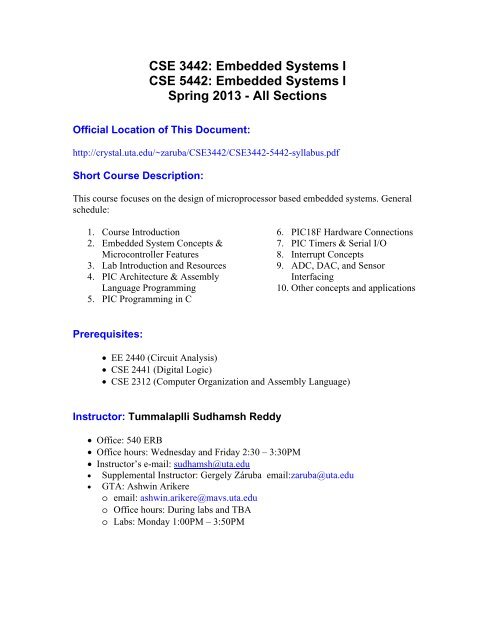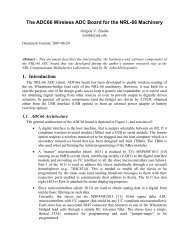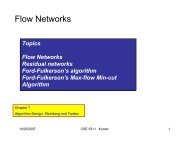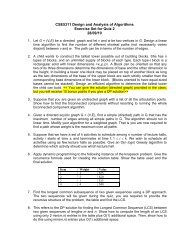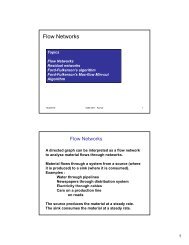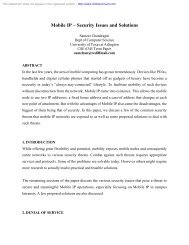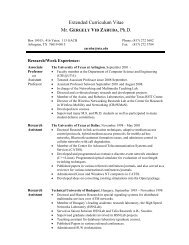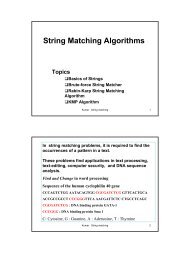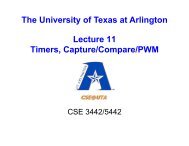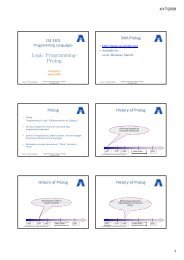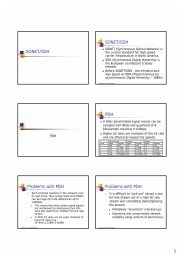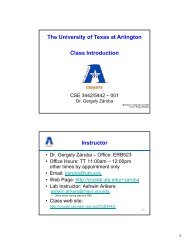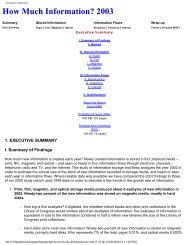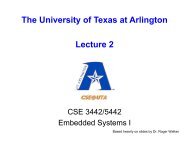CSE 3442: Embedded Systems I CSE 5442 - Crystal - The ...
CSE 3442: Embedded Systems I CSE 5442 - Crystal - The ...
CSE 3442: Embedded Systems I CSE 5442 - Crystal - The ...
Create successful ePaper yourself
Turn your PDF publications into a flip-book with our unique Google optimized e-Paper software.
<strong>CSE</strong> <strong>3442</strong>: <strong>Embedded</strong> <strong>Systems</strong> I<br />
<strong>CSE</strong> <strong>5442</strong>: <strong>Embedded</strong> <strong>Systems</strong> I<br />
Spring 2013 - All Sections<br />
Official Location of This Document:<br />
http://crystal.uta.edu/~zaruba/<strong>CSE</strong><strong>3442</strong>/<strong>CSE</strong><strong>3442</strong>-<strong>5442</strong>-syllabus.pdf<br />
Short Course Description:<br />
This course focuses on the design of microprocessor based embedded systems. General<br />
schedule:<br />
1. Course Introduction<br />
2. <strong>Embedded</strong> System Concepts &<br />
Microcontroller Features<br />
3. Lab Introduction and Resources<br />
4. PIC Architecture & Assembly<br />
Language Programming<br />
5. PIC Programming in C<br />
Prerequisites:<br />
6. PIC18F Hardware Connections<br />
7. PIC Timers & Serial I/O<br />
8. Interrupt Concepts<br />
9. ADC, DAC, and Sensor<br />
Interfacing<br />
10. Other concepts and applications<br />
EE 2440 (Circuit Analysis)<br />
<strong>CSE</strong> 2441 (Digital Logic)<br />
<strong>CSE</strong> 2312 (Computer Organization and Assembly Language)<br />
Instructor: Tummalaplli Sudhamsh Reddy<br />
Office: 540 ERB<br />
Office hours: Wednesday and Friday 2:30 – 3:30PM<br />
Instructor’s e-mail: sudhamsh@uta.edu<br />
Supplemental Instructor: Gergely Záruba email:zaruba@uta.edu<br />
GTA: Ashwin Arikere<br />
o email: ashwin.arikere@mavs.uta.edu<br />
o Office hours: During labs and TBA<br />
o Labs: Monday 1:00PM – 3:50PM
Objectives:<br />
Outcomes:<br />
This course focuses on the design of microprocessor based embedded systems.<br />
Specific topics include embedded PIC microcontrollers, concepts, programming,<br />
system components, architectures, I/O interfacing, and typical applications. A lab<br />
accompanies the lecture where basic interfacing and other design concepts are<br />
investigated and implemented.<br />
By finishing this course, students will possess the knowledge of architectural<br />
concepts of microcontrollers and microprocessor based embedded computing<br />
systems.<br />
Details of Curriculum:<br />
Class meets Tuesdays/Thursdays 9:30AM-10:50AM. Lab session: Monday 1:00 –<br />
3:50PM<br />
Class WWW site: http://crystal.uta.edu/~zaruba/<strong>CSE</strong><strong>3442</strong>/ Note: Please check<br />
WWW site for up to date information<br />
Class mailing list address: <strong>CSE</strong><strong>3442</strong>-ZAR@LISTSERV.UTA.EDU<br />
Note: students are strongly encouraged to sign up for the mailing list of the class;<br />
Please either request membership via the listserv provided web interface OR send me an<br />
email within the first week of classes with the subject:<strong>CSE</strong><strong>3442</strong> and the body containing<br />
your email address.<br />
Text Book: Mazidi, Mckinlay, and Causey, “PIC Microcontroller and<br />
<strong>Embedded</strong> <strong>Systems</strong>,” Prentice Hall, ISBN: 978-0131194045<br />
Lecture slides will be placed on the web. Details of Class Policies:<br />
Course Grades:<br />
Tentatively, course grades will be based on the following:<br />
In class and outside assignments (20%)<br />
o Occasionally an ‘in class assignment’ or homework may be given. Only<br />
those in attendance will receive credit for any ‘in class assignment’.<br />
o <strong>The</strong>re will be no make up for assignments/homework. <strong>The</strong> maximum<br />
grade given for assignments/homework will decline by 10% of the total<br />
grade each calendar day the assignment/homework is overdue starting<br />
razor sharp after the deadline.<br />
Two Midterms: (50% total; 25% each)
o <strong>The</strong>re will two midterm exams during the semester. March 7 th and April<br />
25th.<br />
o <strong>The</strong>re will be no make up exams!<br />
Lab Assignments (30%)<br />
o Based on performance in the accompanying laboratory sessions.<br />
o One of the lab assignments is going to be an “ABET assessment” project.<br />
All undergraduate students must submit documentation sufficient to<br />
receive a passing grade in the course.<br />
Tentatively, course grades are determined from the total points (100) earned as follows,<br />
(but the instructor reserves the right to “grade over the curve,” or even to give everyone<br />
the best grade):<br />
Make-ups:<br />
90-100: A ; 75-89: B ; 60-74: C ;
anything else). If viruses are submitted along with the files a student turns in, the<br />
Instructor may degrade the grade of the assignment.<br />
Drop policy:<br />
Students may drop or swap (adding and dropping a class concurrently) classes through<br />
self-service in MyMav from the beginning of the registration period through the late<br />
registration period. After the late registration period, students must see their academic<br />
advisor to drop a class or withdraw. Undeclared students must see an advisor in the<br />
University Advising Center. Drops can continue through a point two-thirds of the way<br />
through the term or session. It is the student's responsibility to officially withdraw if they<br />
do not plan to attend after registering. Students will not be automatically dropped for<br />
non- attendance. Repayment of certain types of financial aid administered through the<br />
University may be required as the result of dropping classes or withdrawing. For more<br />
information, contact the Office of Financial Aid and Scholarships<br />
(http://wweb.uta.edu/ses/fao).<br />
Academic honesty:<br />
All students are expected to pursue their academic careers with honesty and integrity.<br />
“Scholastic dishonesty includes, but is not limited to, cheating, plagiarism, collusion, the<br />
submission for credit of any work or materials that are attributable in whole or in part to<br />
another person, taking an examination for another person, any act designed to give unfair<br />
advantage to a student or the attempt to commit such acts” (Regents’ Rules and<br />
Regulations, Part One, Chapter VI, Section 3, Subsection 3.2, Subdivision 3.22.) Students<br />
found guilty of dishonesty in their academic pursuits are subject to penalties that may<br />
include suspension from the university. Any student found guilty of academic dishonesty<br />
will receive a -100% for that work (project, exam, homework, etc.) as well as having the<br />
course grade lowered one full letter grade - in addition to any other penalties assessed<br />
(suspension, expulsion, probation). <strong>The</strong>se and other applying UTA rules, will be strictly<br />
enforced. Any case of academic dishonesty will be treated in accordance with the UTA<br />
Handbook of Operating Procedures or the Judicial Affairs website at<br />
http://www2.uta.edu/discipline. If you do not understand this policy, it is your<br />
responsibility to obtain clarification or any additional information you may require<br />
Students are allowed to discuss homework with classmates, but are not allowed to copy<br />
the solutions of others or share solutions with others. All work turned in for grading must<br />
be the student's own work.<br />
Students will be required to sign an academic honesty letter to be kept with the instructor.<br />
Failing to provide with such a letter by census day will result in the respective students’<br />
withdrawal from the class.<br />
In addition to the punishment from the University, the instructor will give a “minus<br />
100%” grade on the given assignment/exam in question.<br />
Disabilities:
If you require any accommodation based on disability, please meet with the Instructor<br />
(with your supporting papers) in the privacy of his office the first week of the semester to<br />
be sure you are appropriately accommodated.<br />
Grievance Procedure<br />
Anyone feeling that a dispute exists after the grading of any assignment or exam may<br />
submit a written grievance. This grievance should identify the item in dispute and<br />
arguments supporting the student’s position. Grievances must be submitted in writing<br />
within two class periods following the return of the assignment. <strong>The</strong> instructor or GTA<br />
agrees to return a written response to the student’s grievance within two class periods<br />
from receipt of the grievance. If the error is due to wrongful calculation of points, then no<br />
grievance needs to be submitted. If a written grievance is received, the instructor and<br />
GTA reserve the right to re-grade the entire exam (not just the specific point in question).<br />
Student Support Services Available<br />
<strong>The</strong> University of Texas at Arlington provides a variety of resources and programs<br />
designed to help students develop academic skills, deal with personal situations, and<br />
better understand concepts and information related to their courses. <strong>The</strong>se resources<br />
include tutoring, major-based learning centers, developmental education, advising and<br />
mentoring, personal counseling, and federally funded programs. For individualized<br />
referrals to resources for any reason, students may contact the Maverick Resource<br />
Hotline at 817-272-6107 or visit www.uta.edu/resources for more information.<br />
Electronic Communication Policy<br />
<strong>The</strong> University of Texas at Arlington has adopted the University “MavMail” address as<br />
the sole official means of communication with students. MavMail is used to remind<br />
students of important deadlines, advertise events and activities, and permit the University<br />
to conduct official transactions exclusively by electronic means. For example, important<br />
information concerning registration, financial aid, payment of bills, and graduation are<br />
now sent to students through the MavMail system.<br />
All students are assigned a MavMail account. Students are responsible for checking their<br />
MavMail regularly. Information about activating and using MavMail is available at<br />
http://www.uta.edu/oit/email/.<br />
Student Support Services:<br />
UT Arlington provides a variety of resources and programs designed to help students<br />
develop academic skills, deal with personal situations, and better understand concepts<br />
and information related to their courses. Resources include tutoring, major-based learning<br />
centers, developmental education, advising and mentoring, personal counseling, and<br />
federally funded programs. For individualized referrals, students may contact the
Maverick Resource Hotline by calling 817-272-6107, sending a message to<br />
resources@uta.edu, or visiting www.uta.edu/resources.<br />
Student Feedback Survey:<br />
At the end of each term, students enrolled in classes categorized, as lecture, seminar, or<br />
laboratory will be asked to complete an online Student Feedback Survey (SFS) about the<br />
course and how it was taught. Instructions on how to access the SFS system will be sent<br />
directly to students through MavMail approximately 10 days before the end of the term.<br />
UT Arlington’s effort to solicit, gather, tabulate, and publish student feedback data is<br />
required by state law; student participation in the SFS program is voluntary.


